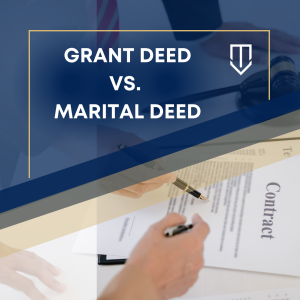 Dividing property following divorce or dissolution proceedings can be complicated under family law principles. If the property has appreciated in value, this can make dividing it more contentious and complicated.
Dividing property following divorce or dissolution proceedings can be complicated under family law principles. If the property has appreciated in value, this can make dividing it more contentious and complicated.
Under family law, a married couple’s earnings received during marriage are considered community property and are divided evenly at divorce. (Cal. Fam. Code § 770-772.) Property that is held in joint title by the spouses is usually considered community property and will be divided as such, meaning 50/50. (Cal. Fam. Code § 2581.) Property can also be converted to joint title if one spouse held it separately before the marriage. This presumption that the property is community property applies absent a written agreement otherwise. Couples can also execute an Aufmuth agreement which essentially states the spouse contributing separately gets a pro rata share in the increased equity of the property or asset. (Cal. Fam. Code § 852.) This ensures the spouse does not just get a flat reimbursement of the amount they paid.
How is Community and Separate Property Divided?
 California Partition Law Blog
California Partition Law Blog


 Generally, married couples who buy homes in California are afforded certain rights and protections under California law. These rights and protections do not necessarily apply to unmarried couples who own property as tenants-in-common. Unmarried couples can still take further steps to protect their property rights.
Generally, married couples who buy homes in California are afforded certain rights and protections under California law. These rights and protections do not necessarily apply to unmarried couples who own property as tenants-in-common. Unmarried couples can still take further steps to protect their property rights. The deed to a property is the most important document a property owner has. It describes the title and its associated rights while operating as the conveyance of property itself. But not all deeds are the same, especially when marriage enters the equation.
The deed to a property is the most important document a property owner has. It describes the title and its associated rights while operating as the conveyance of property itself. But not all deeds are the same, especially when marriage enters the equation.